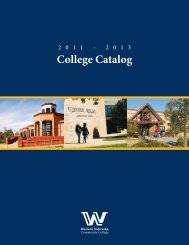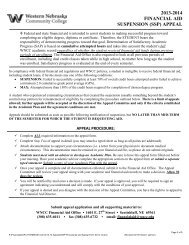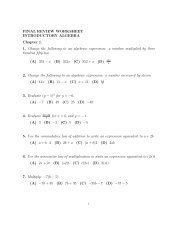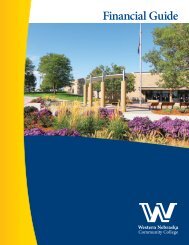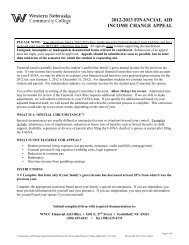WNCC 2010 Self-Study Report - Western Nebraska Community ...
WNCC 2010 Self-Study Report - Western Nebraska Community ...
WNCC 2010 Self-Study Report - Western Nebraska Community ...
You also want an ePaper? Increase the reach of your titles
YUMPU automatically turns print PDFs into web optimized ePapers that Google loves.
The Associate Degree in Nursing program (which is new to <strong>WNCC</strong>) was approved by the <strong>Nebraska</strong><br />
State Board of Nursing before it was implemented, and the institution is currently in candidacy<br />
status for accreditation by the National League for Nursing Accrediting Commission as well. Upon<br />
successful completion of the program, students are eligible to sit for Registered Nursing boards,<br />
leading to the issuance of a professional nursing license. As with the PN program, success rates<br />
for graduates sitting for Board exams are tracked.<br />
The Powerline Construction, Safety, and Maintenance Program curriculum is based on the<br />
Merchant Job Training and Safety Program, a nationally-recognized curriculum. <strong>WNCC</strong>’s<br />
Automotive Technology and Auto Body Technology offerings have been certified for the last 20<br />
consecutive years by the National Automotive Technicians Education Foundation. <strong>WNCC</strong>’s<br />
Cosmetology Program curriculum is based upon the State of <strong>Nebraska</strong> Cosmetology standards<br />
from the <strong>Nebraska</strong> Department of Health and Human Services. In order to obtain their<br />
cosmetology license, students must take the State Board Written Practical Exam.<br />
Information Technology emphasis area instructors have participated in Program 99 and Future<br />
Force <strong>Nebraska</strong> programs. These two initiatives help community colleges across <strong>Nebraska</strong> align<br />
information technology curriculum. IT faculty members also participate in Working Connections, a<br />
faculty-development conference sponsored by the Midwest Center for Information Technology.<br />
Quarterly meetings are held to help promote articulation, faculty development, student recruitment,<br />
and to develop new ideas for teaching and curriculum.<br />
Transfer and Articulation Agreements<br />
In order to be sure that the curriculum at the College is current and meets the standards within a<br />
discipline area, <strong>WNCC</strong> follows the <strong>Nebraska</strong> Transfer Initiative for transfer-level coursework, which<br />
guarantees transfer of courses within the state of <strong>Nebraska</strong> to any college or university. <strong>WNCC</strong><br />
has a more complete agreement with Chadron State College because of the number of<br />
concurrently enrolled students. In addition, <strong>WNCC</strong> has separate, program-specific transfer<br />
agreements with various institutions, such as Clarkson College, Midlands Lutheran, the University<br />
of Wyoming, Kaplan University, the University of <strong>Nebraska</strong>-Lincoln, the University of <strong>Nebraska</strong>-<br />
Omaha, the University <strong>Nebraska</strong>-Kearney, Cabela’s University, and is developing them with the<br />
South Dakota School of Mines, the College of Saint Mary in Omaha, and National American<br />
University.<br />
Besides adhering to formal articulation agreements, the guidelines for best practices set by the<br />
Higher Learning Commission, as well as those of the <strong>Nebraska</strong> <strong>Community</strong> College Association,<br />
are closely followed. In <strong>Nebraska</strong>, a set of rules prescribe instructor credentials, syllabi<br />
construction, and textbook usage. <strong>WNCC</strong> credits transfer readily to other colleges or universities,<br />
even those courses which are used as electives in particular programs. The Faculty and Staff<br />
Handbook makes clear that although instructors have latitude in determining how competencies<br />
are met, they must follow the course content described in the master syllabus because other<br />
institutions rely upon the integrity of those courses when making decisions about allowing students<br />
to transfer credit.<br />
The College also has working agreements with a variety of organizations such as the regional<br />
hospitals, public health care facilities, nursing homes, businesses, and the county jail to provide<br />
<strong>Western</strong> <strong>Nebraska</strong> <strong>Community</strong> College Page 145




